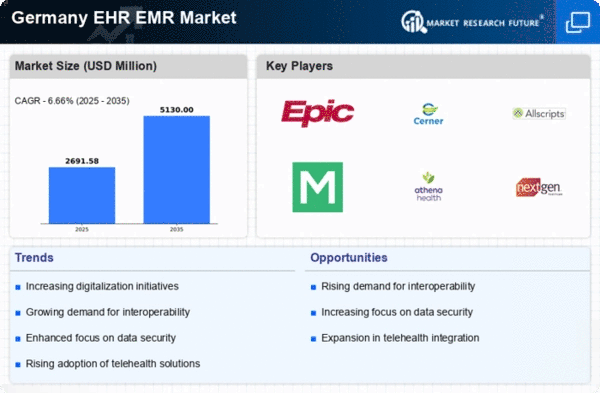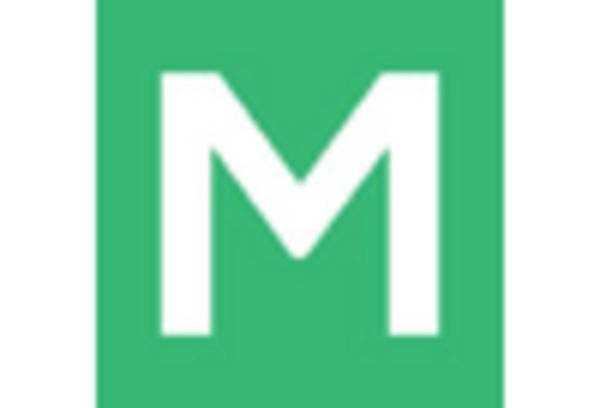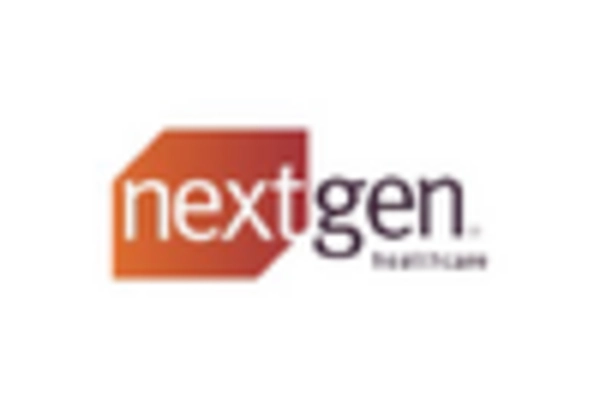Focus on Patient-Centric Care
The shift towards patient-centric care is reshaping the ehr emr market in Germany. Healthcare providers are increasingly prioritizing patient engagement and satisfaction, leading to the development of ehr emr systems that facilitate better communication and interaction between patients and providers. Features such as patient portals and mobile applications are becoming standard, allowing patients to access their health information and communicate with their healthcare teams more effectively. This trend is expected to drive market growth, as patient-centric solutions are likely to enhance the overall healthcare experience. By 2025, it is projected that over 70% of healthcare facilities in Germany will adopt patient engagement tools within their ehr emr systems.
Increased Focus on Data Security
Data security remains a paramount concern in the ehr emr market in Germany. With the rise of cyber threats and data breaches, healthcare organizations are compelled to invest in robust security measures to protect sensitive patient information. The implementation of stringent data protection regulations, such as the General Data Protection Regulation (GDPR), has further heightened the focus on data security within ehr emr systems. In 2025, it is anticipated that spending on cybersecurity solutions in the healthcare sector will exceed €1 billion, reflecting the industry's commitment to safeguarding patient data. This emphasis on security not only protects patients but also enhances trust in digital health solutions, thereby supporting the growth of the ehr emr market.
Rising Demand for Data Analytics
The increasing demand for data analytics in the healthcare sector is significantly influencing the ehr emr market in Germany. Healthcare providers are recognizing the value of data-driven decision-making, which can lead to improved patient care and operational efficiency. The ehr emr market is adapting to this trend by incorporating advanced analytics capabilities into their systems. In 2025, it is estimated that around 60% of healthcare organizations in Germany will utilize data analytics tools integrated within their ehr emr systems. This shift not only enhances clinical outcomes but also supports regulatory compliance and quality improvement initiatives, thereby driving market growth.
Government Initiatives and Funding
Government initiatives play a crucial role in the growth of the ehr emr market in Germany. The German government has implemented various policies aimed at promoting digital health solutions, including substantial funding for healthcare IT projects. In 2025, the government allocated over €500 million to support the digitization of healthcare services, which includes the development and implementation of ehr emr systems. This financial backing is expected to accelerate the adoption of electronic health records across hospitals and clinics, enhancing interoperability and data sharing. Additionally, the government's commitment to improving healthcare infrastructure is likely to foster a more conducive environment for ehr emr market growth.
Technological Advancements in Healthcare
The ehr emr market in Germany is experiencing a surge due to rapid technological advancements. Innovations such as artificial intelligence (AI) and machine learning are being integrated into electronic health records, enhancing data analysis and patient care. These technologies enable healthcare providers to streamline operations, reduce errors, and improve patient outcomes. The market is projected to grow at a CAGR of approximately 10% from 2025 to 2030, driven by the increasing adoption of these advanced technologies. Furthermore, the integration of telemedicine solutions within ehr emr systems is becoming more prevalent, allowing for remote patient monitoring and consultations. This trend is likely to reshape the healthcare landscape, making it more efficient and accessible.
















